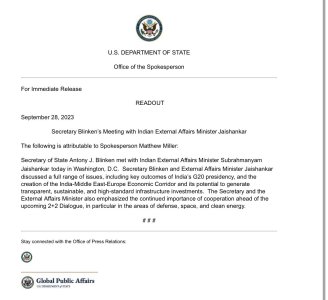Sources told News18 that the Royal Canadian Mounted Police visited the offices of Rahat Rao in Surrey and questioned him for two hours in connection with the murder of Khalistani extremist Hardeep Singh Nijjar
Teams from the Royal Canadian Mounted Police (RCMP) visited the offices of Rahat Rao, an alleged ISI plant, in Surrey and questioned him for two hours in connection with the murder of Khalistani extremist
Hardeep Singh Nijjar, sources told News18.
Sources added that Rao was asked to delete all posts from his social media pages in front of the RCMP personnel.
“RCMP did not disclose the reason for their visit publicly, but it was possibly related to his knowledge about the killing of Nijjar,” a source said.
Canadian Prime Minister Justin Trudeau has alleged that the Indian government was behind the killing of Nijjar, 45, outside a gurdwara in Surrey in British Columbia on June 18. India had designated Nijjar as a terrorist in 2020.
India has rejected the allegations as “absurd” and “motivated” and expelled a senior Canadian diplomat in a ***-for-tat move to Ottawa’s expulsion of an Indian official. India has also asked Canada to crack down on terrorists and anti-India elements operating from its soil and suspended visa services for Canadians.
News18 had earlier reported that the hand of Pakistan’s spy agency ISI is suspected to be behind Nijjar’s killing.
Sources had told News18 that Rahat Rao and Tariq Kiyani are ISI plants in Canada, doing the maximum work for the spy agency. “They are even handling the terrorists who come from India and are on the wanted list.”
Sources said Nijjar may have been killed for business reasons and that Rao and Kiyani may have wanted to control the drug business. Sources said the trio of Rao, Kiyani and Gurpatwant Singh Pannun possibly laid the trap to control the drug and immigration business which is the main source of income for them.
Amid Canada’s allegations of India’s “potential” involvement in the killing of Nijjar, External Affairs Minister S Jaishankar has said that New Delhi conveyed to Ottawa that it is not the government of India’s policy and it is open to looking at “specific” and “relevant” information in the case.
Jaishankar made the comments in a conversation at the Council on Foreign Relations in New York on Tuesday after addressing the UN General Assembly session.
“Yes, I do have a comment. I’ll share with you very frankly what we told the Canadians,” Jaishankar said when asked if he had any comment.
“One, we told the Canadians that this is not the government of India’s policy,” Jaishankar said. “Two, we told the Canadians saying that look, if you have something specific, if you have something relevant, let us know. We are open to looking at it,” Jaishankar said while responding to a question from former US Ambassador to India and CFR Distinguished Fellow Kenneth Juster, in his first public comments on the issue.
Jaishankar asserted that one must also understand the context because the “picture is not complete” without the context of it.
“You also have to appreciate that in the last few years, Canada actually has seen a lot of organised crime relating to the secessionist forces, organised crime, violence, extremism. They’re all very, very deeply mixed up,” he said.








